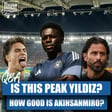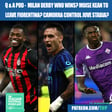Become a Creator today!Start creating today - Share your story with the world!
Start for free
00:00:00
00:00:01

The ACL Epidemic: From Bremer & Carvajal To Chiesa & Rodri - What's Causing Football’s Injury Crisis? (Ep. 461)
In recent months and years there has been an explosion of ACL injuries which has now reached epidemic proportions, with Gleison Bremer, Dani Carvajal, Duvan Zapata and Rodri the latest starts to tear their anterior cruciate ligament in their knee.
Carlo Garganese interviews top sports physiotherapist Dr Rajpal Brar to discuss a serious issue that is plaguing Italian football and football in general.
Every Monday episode of The Italian Football Podcast + all extra interview episodes are free for all.
To NEVER miss an episode of The Italian Football Podcast (as well as support the show), go to Patreon.com/TIFP or on Spotify to become a Patron for only $2.99 USD per month (excluding VAT).
Transcript
Introduction to ACL Injuries in Italian Football
00:00:02
Speaker
Welcome to the Italian Football Podcast. Hello, everybody, and welcome to the Italian Football Podcast. I'm Carlo Garganese. On today's show, we will be tackling a ah very big issue in football, especially for Italian football, and that is the explosion of ACL injuries.
00:00:20
Speaker
In recent years, Italian football and the Italy national team has been severely damaged by ACL tears and ruptures. It's something that we've spoken about a lot on the podcast. We've seen Federico Chiesa, Nígolo Zagnolo never realized their potential after ACL injuries. And we've had so many other Italy stars tear their ACL, including this year,
00:00:44
Speaker
Gianluca Scamaca, Giorgio Scalvini and it's happening with with more and more regularity, not just in Italy but but throughout the footballing world and the last week alone we have seen Juventus' Glace and Brema, we've seen Torino's Duvan Sepata and we've seen Real Madrid's Danny Carverhouse suffered torn ACLs and of course there was a very even more high profile one with Roger from Manchester City and just a week or two ago as well.
Expert Insights: Dr. Rajpal Abra on ACL Injuries
00:01:10
Speaker
um So ACL injuries, there's been many studies that have said that they've increased, I saw one study saying that they've increased 29 fold in the last two decades.
00:01:20
Speaker
So we want to find out what is causing this explosion of ACL injuries and and what can be done about it. And to help answer this question, I'd i'd like to welcome onto the show Dr. Rajpal Abra, who is a very prominent is very prominent on social media and Twitter when it comes to to sports and and football injuries and is and it' one of the best sources on the subject of ACL injuries. He's a sports physiotherapist who works with with many elite athletes based in in the United States.
00:01:49
Speaker
doctor of physical therapy, a strength and conditioning specialist, a movement and mechanics coach, and a sports scientist, just to just to name a handful of his of his qualifications and skills. So, so Raj, thank you so much for for joining us. How are you doing? Yeah, thanks for having me. I'm i'm doing well. I appreciate you taking the time to talk about, like you said, a topic that is becoming more and more prevalent, unfortunately.
00:02:18
Speaker
Yeah, unfortunately so. If we start off very simply first, if you could just tell us like what is an ACL and what what is ah an ACL injury just in layman's terms. Yeah, sure. um I mean, the ACL stands for your anterior cruciate ligament. People may often hear about you know the cruciates. It's actually the ligament in your knee that is a primary stabilizer for the knee, especially against, we call anterior translation, the knee moving forward and then rotation as well. And so um when you have a rupture or a tear, that ACL essentially fully tears
00:02:58
Speaker
and which then, of course, ah limits the stability in the knee. um A lot of it with ACLs, people always ask me, you know, can you walk off? Yes. the the main The main issue comes is when you're cutting or moving in different directions, that's where it tends to be a major stabilizer. So that's that's really the issue when it comes to having an ACL injury or or rupture is that your knee is now Typically unstable when it comes to any non straight line movements. Yeah for sure changing direction so correct the the recovery period With with for an ACL tear or rupture. What is the the usual recovery period and the usual
The Recovery Process from ACL Injuries
00:03:40
Speaker
recovery? process I guess with in terms of you know surgery and and recovery and
00:03:45
Speaker
Yeah, I mean, honestly, it really varies. So the first thing to understand with an ACL rupture is that what is the full extent of the damage? Not just obviously the ACL itself, but also oftentimes you can have associated menistus damage, which is tissue in the knee. You can have other ligament damage as well. For example, you mentioned Danny Carball. I believe he has, I think if I remember correctly, he also has damage to another ligament.
00:04:12
Speaker
that can then extend the rehab timeline. ah Typically with elite footballers, looking at around seven to nine months has kind of been the standard these days. And of course, that's there's gonna be variants around that. But then the main thing I'm looking at really is return to pre-injury levels. And this is completely anecdotally just um from what I've seen. I will typically live around 18 months as a benchmark after a surgery to see where the player is in terms of how they compare to pre-injury levels. so And then you mentioned surgery. Typically for elite athletes, surgery is going to be the recommendation. I mean, there are now new techniques in terms of what
00:05:02
Speaker
you use to help replace that ACL. For example, like ah it used to be really a lot of hamstring grafts or patellar tendon grafts. Now there's also a quad graft that's coming in. You can use other parts of your anatomy to help reinforce the ACL as well, which we're seeing more and more. So there are techniques and in terms of that. And then in terms of rehab, it's really first allowing that ACL to settle, but we're we're seeing more and more trying to get players back to weight-bearing as fast as possible.
Causes of Non-Contact ACL Injuries
00:05:38
Speaker
And then it really just becomes more of a functional rehab where you're trying to you're trying to maintain mobility, improve strength, and then gradually move that player from basic activities to more advanced activities that can be multi-directional, and then eventually sports-specific activities.
00:05:56
Speaker
Yeah, for sure. I mean, I think the the time recovery period is definitely shortened over, as I remember going back 30 years when it used to be 18 months sometimes, the the recovery just before you even get back to playing on the pitch. But obviously, you're saying now 18 months to to try and get back to to to the to the former level. So we'll come on to that again later because that has been one of the problems with, especially with some of these Italian players, like Chiesa and Sanjolo, that they've never really got back to their to their former level. So I do want to tackle that again a little bit later on. But if we can look at um
00:06:31
Speaker
what are the main core in general before we kind of dive a little bit deeper into into some of the specifics like what are the main causes and risk factors for for ACL injuries?
00:06:44
Speaker
Yeah, the first thing to really parse out here is we have contact ACL injuries and non-contact, right? Like for example, I don't know if you saw a Danny Godavajal's injury where he's kicking through and he hits the player's leg. And so, um you know, that's going to be a very different cause. If you get hit by enough force,
00:07:05
Speaker
Typically infinite break or tear something right? So that is very different than let's say Bremer or the by the way that which are non-contact or Kiesa or Zenyolo which have been or Rodry which have been non-contact injuries typically where the player is Has a spontaneous movement or a cut and that knee goes in those cases, you know, it's typically very multi-factorial I think the most We've seen recently and we've talked about this or a lot of people have talked about this now more so is just the fatigue on players and the workload in their schedule, especially not having any offseason. So we know but how fatigue can play a part leading to some of these ACL injuries.
00:07:51
Speaker
and then i but yeah If I could just stop you on there, because because that was going to be my next question, so I guess we might may as well expand on that. Now, how does fatigue impact ACL injuries? In playing more matches, doing more training, why does that make a ah footballer more likely to to get an ACL injury? What does it do to the body?
00:08:12
Speaker
yeah so We have to understand, so an ACL, this is a little bit more detailed, a ligament is what we call a passive stabilizer, meaning muscles are your active stabilizer. So when you're playing, right you're cutting, you're moving, those muscles are actively contracting right to help stabilize your joints. Now, if those muscles can't do the job,
00:08:38
Speaker
Now the stress goes to your secondary passive stabilizers, your ligaments. So what happens when you when you're fatigued is that those muscles may be unable to cope right because they're overworked. And now you have an undue amount of stress going into these knee ligaments. That's why The most, like for example, like with the rogerie or a lot of these knee ligament injuries, these are movements the player have done thousands of times, right? So it's like, okay, why on this specific one does that knee now go? It's for whatever reason is that during that movement, that stress now went to the ligament instead of going to where it should have, which is the muscles. And there's lots of underlying reasons for that. But oftentimes we find that fatigue can lead to that kind of that cascade.
00:09:28
Speaker
Yeah, for sure. And that's something that Roger spoke about, ironically, before he hed done his injury, he said that yeah they were considering going on strike because there's there's too many games. So yeah, play it played out true. Yeah, so sorry, yeah before I butted in, like so what what other cause other than fatigue what other causes and risk factors are there?
00:09:46
Speaker
The potatoes won. Another one is jumping too quickly, um in terms of so in terms of ah like the intensity of competitions, where you don't have a proper ramp up. So I mean, Roger, another example of this, I believe like he only had a few balance matches after his after coming back. i And he went straight into a very highly competitive arsenal match, right? And so that can play a factor as well, which we often see just having that big jump in stress level on the body, which it's not accustomed to. That can certainly be one. There are some credence to training techniques, but I can't really speak on that because it's so it's so club and player specific. right and so That's another factor.
00:10:30
Speaker
We're regarding to training techniques, though, because this is something that has been discussed in Italy. In Italy, the especially pre-season, they go berserk with what they call itiadors. They're like training camps. they They go into the mountains. They run, run, run, run, run, especially certain culture. Antonio Conte, for example, is is known as a drill, like a drill sign. and and there's there's and they they they really do work them into the ground. um Surely, if and that is generally the training, that kind of running kind of physical training is more, they they do more of that in Italy than than than in other countries, but would that kind of training, would that make you more likely for ACS because it added adds to the kind of the pressure the pressure on the body, the fatigue?
00:11:13
Speaker
um yeah Yeah, I mean, it might just be it might just be a reason for overload, right, if you're not respecting where the body is. And again, we talked about, you know, ramping up too quickly can certainly lead to fatigue and overload, especially now that you have players who don't have a proper break over the summer And they're already kind of burning the candle at both ends. You add that as another stimulus to a player who's already overworked. And then you add this kind of this boot camp, right? And it could be kind of the the final straw that broke the camel's back. And so like like, yeah, so I like I'll give you an example from the Premier League, just because I'm the most familiar. Like, it takes a lot if you really want to build true fitness,
00:11:58
Speaker
It takes years to do so. It's not just one camp that does it. For example, like went when Mikel and I took over Arsenal, it took I remember this
Long-Term Athlete Health vs. Quick Fixes
00:12:08
Speaker
distinctly, I follow Arsenal. It took him two years until he said, I'm now happy with my team and their fitness levels.
00:12:16
Speaker
So it's not just something you can come in, have a boot camp, and now you're okay, right? It's really much more, ah to do it safely and effectively, it requires a much more methodical process. Yeah, that that that completely makes sense. and And in reference to your, um you know, going from, you know, from from from straight up into, you know, from from scratch to it to to to to a high level intense game. Yeah.
00:12:45
Speaker
I don't know whether, ah and I don't know whether you know, but it does seem like they're they're generally, especially in Italy, there always seems to be a lot more ACLs at the beginning of seasons or at the end of seasons. So I don't know whether that is partly the beginning is because like you said, because for that reason, maybe the end of the season due to fatigue. but so yeah we I would say the same thing. i was I'd say the start of the season, and this we we tend to see that tends to also reflect injuries, soft tissue injuries in general. Soft tissue being includes ligaments, but also muscles and also bone. Start of the season, because you have players who are still adapting to that jump from preseason into normal season games.
00:13:21
Speaker
And then end of season can be fatigued. And I think now the added variable, right, is you also have, let's say, for example, more Champions League games with higher profile teams playing each other earlier, which is already a jump in intensity quicker than you're used to. And so you have that aspect.
00:13:40
Speaker
And then we can even add in, like if you're going back a a couple of years, right you have the addition of the World Cup mid-season, which messes with everyone's training schedule. So you add all these in. right So there's just multiplefaal ah multiple factors.
00:13:56
Speaker
I think one thing I do want to touch on before anything else, we spoke on, you know, Contes training programs. I don't blame the coaches because your manager are now also held to go standard where they're not, they're not given time to succeed, right?
00:14:12
Speaker
So if I'm a manager coming in and I know my job might be on the line if I lose five matches, I don't have two years to have these players come up to the fitness levels that I want. right So there's that mismatch between fitness expectation and the manager having a target on their back. So right there's there's that aspect too. That's a mismatch for sure as well.
00:14:39
Speaker
Everyone's under pressure, for sure. And just before everyone that's listening that that are Antonio Conte fans, it will be screaming. I should actually stress, though, that I don't, from from as far as I know in the top of my head, Conte doesn't actually have a bad record with ACL injury. That might be a bad example to use. I'm just using him as an example because that is the kind of coach he is.
Impact of Playing Surfaces on Injury Rates
00:14:58
Speaker
But um just just also on the on the factors, and if there's any else any others you want to add after this,
00:15:04
Speaker
I wanted to ask you about, because this has been a debate as well, I know Steven Gerrard spoke about this a few years ago, about the the debate on the increase in artificial and partly synthetic or what we call hybrid pitches, whether the surfaces play a role in and in these in this increase in ACL injuries, because when again, going back 30 years when I started watching football, it was all grassed mainly all grass pitches, you'd have the odd artificial pitch. Nowadays, it's all made you know mainly kind of like hybrid pitches,
00:15:33
Speaker
And just look thinking of it logically, because I played, I played the same professionally, you know, there was, and I was very injury prone myself as well. um There was, you know, there's less giving the ground when you play an artificial, partly artificial ground. Like just thinking of things things logically with no medical background, you know, that to me, that would seem like more of a risk factor to, I mean, I don't know about ACLs, but certainly for injuries, because if you've got, you know, that puts more pressure on you. but I don't know. I mean you and know we've spoken offline. There's no kind of nothing to really say to back this up, but could there be anything in this? Yeah. I mean, this it's so hard to say because there's so many times where the theory, and it may or may not line up with reality. I mean, the research I've seen is that with hybrid grounds, there is an increase in foot and ankle injuries.
00:16:25
Speaker
But nothing has been shown for ankle injuries. The one thing I see not ankle off for knee injuries. The one piece of information I've seen on knee injuries actually is the drier the ground, the higher level there is for our knee injuries because your foot is more likely to get stuck. Whereas when it's raining or slippery grounds, your foot will just slip.
00:16:46
Speaker
and which will take the torque off the knee. So that's the only research I've seen, but it also might require longer-term research because these are relatively newer grounds with the harder surfaces.
00:16:57
Speaker
and so um I think it's still TBD, but as of right now, I haven't really seen that information. I also think there's a lot of selective attention because you'll see, this especially happens like in in American sports and NFL and football American football, like a player just injured on one of these new grounds and all the players complain, but when it happens on ah on a grass field, no one says anything. So a lot of it can just be that selective attention aspect too, right? and That's why research is so important.
00:17:29
Speaker
Yeah, that that that totally makes that totally makes sense. um So if we tackle specifically why there has been such an explosion in ACL tears in recent years, and I'll just read out a few figures so everybody understands kind of how bad it is.
Rising ACL Injury Statistics in Europe
00:17:42
Speaker
um I saw on Twitter, I'm sorry, I haven't put down who who tweeted this, but there have been 38 cruciate ligament injuries in Europe's top five leagues in 2024 so far. Actually, that's 39 now because We're recording this on Monday. Luban Zapata has been confirmed as a Lisi Altea as well. but so With 18 of those just happening just two months into the into the current season, Premier League, five in total in 2024, one this season. La Liga, four in total in 2024, three this season. Liga, 11 total.
00:18:17
Speaker
in 2024-6 this season. Seria is the leader with 13 total 7 this season and the Bundesliga 6 total in 2024 won this season. so it is i mean those are really valuable because i mean I've seen some studies that I saw one from a consultant orthopedic surgeon Neve Davis saying that ACL injuries have increased 29 fold compared to two decades ago. um so i mean The bottom line is that i mean the numbers show that it is The numbers are increasing massively. So what is the reason for the explosion? I know we've gone through the risk factors as there, but what would you say is, do you think it is fatigue and the number of matches that are the ah really, really driving this? If I had to lay down on a one thing.
00:19:03
Speaker
it would be that, it would be the scheduling, it would be the scheduling. And that's ah that's not just, the reason I'm saying that is because it's not just football specific. If you look at other leagues where the games have gone up, you also see a jump in injuries. So ah for example, I don't know if you follow at basketball at all, but the NBA,
00:19:26
Speaker
after their 2020 season where the season was delayed. They had their shortest, ah they had their shortest offseason of all time, which is 45 days, which would be incredible for footballers. ah But in the NBA, you typically have three plus months off. This was 45 days.
00:19:43
Speaker
And they had a huge increase in injury risk until they went back to the normal offseason, again, the following season, right? And in football, it's the opposite, where you have less and less of an offseason to be able to recover. And if I had a pinpoint one thing, it really would be this fixture congestion.
00:20:03
Speaker
just because you need it's so critical to be able to have a break physically and mentally, especially from elite score. That would honestly be the one thing I would point to the most. And that's why when footballers speak out about it or coaches do, I want more to do so. so Yeah, yeah, come on to that. I mean, it's just, it's incredible. And we've discussed this a lot on the pod that since the COVID ah pandemic in 2020, when that broke out, I mean, there's virtually
Reducing Fatigue: Proposals for Player Health
00:20:30
Speaker
not been any hasn't been any rest at all, because yeah there was the the the summer of 2020 that they, you know, we, it resumed football restarted again, and there was no summer break then, because it was played during the summer. the chi had
00:20:41
Speaker
trump ben and Then in 2021, the Euros were played in in in the year in the summer of 2021 because it'd been pushed back from 2020. Then in 2022, there was a very short summer break, much shorter so the summer break, because there was, like you said before, there was the Mid-Season World Cup.
00:20:58
Speaker
in 2022. So there was no real, between twenty that summer and the summer after, that whole season was completely changed. And then, of course, there was the the Euros in 2024, and then we've got this ridiculous Club World Cup in 2025, and then the World Cup in 2026. So this is going to be not between 2020 and 2026 inclusive. There's basically no rest at all. It's mad.
00:21:22
Speaker
So the big question is, what can be done to to try and decrease the the number of of ACL injuries, this this ACL epidemic? and And what would you like the the football in decision makers and the football authorities to do? Because I mean, they have to do something about it, don't they?
00:21:40
Speaker
Yeah, I mean, it's it's truly the big question. I mean, ideally, what I would love to see is some sort of six to eight week minimum offseason for players. um I know it's tough to navigate with all the international games, but I think that would be the ideal and it's twofold, not simply um for the recovery of players, which obviously is is is crucial.
00:22:04
Speaker
But the offseason is also typically a time where players build up their strength and fitness for the upcoming season as well. and So because you have the time and you're not constantly playing in games, you have the ability now to build up your baseline. So as it stands, not only are players being asked to do more,
00:22:30
Speaker
But they're being asked to do it you know with with less, for lack of a better term. They're not even allowed to build up their fitness. So you have this complete mismatch. You can't recover. You can't build up your baseline. But yet, you you you're asked to do more and more and more intensity games with more workload, et cetera, et cetera. So I really think you need that six to eight week circuit breaker and then build up time ah firstly. And then secondly,
00:22:59
Speaker
I feel like it'll never happen. I don't think this will ever happen. But some sort of cap on games over you know per X amount of days or or months would be great. But I think from a more pragmatic perspective, what you're seeing is clubs.
00:23:16
Speaker
who are understanding how to rotate their players better, whether that's take them out earlier in matches or not allowing them to go to some of these you know international games. And then also last but not least is also potentially building up their roster a little bit more so you can rotate more.
00:23:34
Speaker
But then the problem with that comes is the best players obviously want to play. So how that that's going to be now more on the manager to balance right some of those personalities.
The Financial Pressure of Increased Games
00:23:45
Speaker
um I think the biggest issue for me is that we know the underlying cause of why players are playing more, right? It's money. All these tournaments generate a lot of money. And when has UEFA ever turned that down?
00:24:00
Speaker
um more more it's always more more more yeah oh Club World Cup is the best example that and an and an increased World Cup as well. It's expanded to the 2018 World Cup. Some more games in the World Cup as well. yeah More games in the Champions League as well. sounds like More, more, more. yeah yeah And you're seeing, I think you saw at the Euros, you're seeing a watered down product as guys are tired.
00:24:22
Speaker
right like and like thought I thought it was a poor quality Euros with exceptions to Spain. I thought all of the big nations, but Germany were okay, but apart apart from that that, the teams looked tired, they they've lacked intensity. it was just it wasn't good It wasn't a good spectacle at all. Absolutely. absolutely i mean that That's part of it. and then that's if If a player doesn't get injured, they're going to be gassed out, they're going to be fatigued, which of course impacts them.
00:24:49
Speaker
and then when they come back it impacts them of course right like as we saw with multiple players who play deep into the euros so either you're not fit and you're going to be at increased injury risk you're not going to be able to play in all the games so there's a huge massive knock-on effect but i think the problem is those shiny you know those the That money is just too much for a lot of these, ah ah for UA Fund FIFA to turn down, especially since the the decision makers aren't the ones at risk, right? It's the players. So that's that is the issue.
00:25:26
Speaker
I agree, and and that's why I think that, you know, what Roger said about players going on Strive, that's why I think that they they should consider that. I mean, otherwise, what how are they going to get the message across and make them change? Because, you know, you try and sell to somebody, oh, well, you're going to make, you're going to play less games, but you're going to make less money. It never happened. Doesn't matter about safety. We see that everywhere in any business around the world. So, so yeah, um I do think something needs to be done because is football is is really ruining football. um and that brings me on to the final question is because the ACL injury has become the dreaded injury in football again 30 years ago it used to be a broken leg a broken leg used to be that the injury that everybody any footballer or sportsman used to feel I don't want to break my leg you know that's gonna rip now it's ACLs now it's like a broken leg is no one gets what that was worried about but no one hardly anyone breaks their leg in football anymore.
Psychological and Role-Based Recovery Challenges
00:26:19
Speaker
No one's worried about breaking legs anymore. No, it's all about the ACL. So why isn't the ACL such a dreaded injury? And why does so many players like Zanyo and Kiesa who you know were for many generational Italian talents but have never been since they come back have been shadow have been shadows of their former selves. Why do so many players find it so difficult to return from ACLs as the same player?
00:26:43
Speaker
Yeah, I think it's it's it's multiple things that it usually is. I think the first part here is because the ACL, ah the game has become so dynamic and multidirectional, right? The speed has never been higher. Tenor direction has never been higher. Some of the demands on players just on the pitch have never been higher. So now with the ACL, I like i talked about at the at the start of the podcast, right? It's one of the main stabilizers for multi-directional knee stability. And so there's a bigger demand on it all the time. So I think that's one part of it. I think secondly, with that, and we see more research on this, is the confidence factor in your knee, especially after a non-contact injury.
00:27:28
Speaker
So let's you know let's say said you played with injuries. Let's say you were out there playing and you just made ah made a cut you've made thousands of times before and you did your ACL. Even though you know the underlying factors, right? Let's say this person is very, very in tune with all the things we've talked about and they understand it was probably fatigued. It wasn't their own fault. But in the back of your head, you're still thinking, I just did a normal cut.
00:27:53
Speaker
Right. i did and And I did my ACL and I've been out for what I know, ideally whatever six, eight months. So that's going to be in the back of your head. There's a term for it called kinesiophobia, fear of movement or re-injury. That's one of the hardest things to get over when it comes to ACL injuries. And you can only get over it. There's much better sports psychology programs now. Like every team has a sports psychologist for the most part, but the only way get to get through that is to go through these matches again.
00:28:22
Speaker
ah you have to get out there and play but that still comes with that trepidation factor and that's why that 18 month mark for me it's a key reason for it's why it's so extended. um i mean that That's another part of it.
00:28:36
Speaker
And thirdly, and this especially applies to Syria, we've seen, you've seen guys come back very, very fast from ACL ruptures. And he although came back from this first one way sick, fast, yes, six months. I think, yes, ah they took their, took their time with him. Thankfully also like obviously hasn't been himself.
00:28:57
Speaker
So before I forget, that's one other aspect is the pressure component. When you get back for a player like, right, is that players, excuse me, fans right away are like, oh, you want to see the player who's back. And I think the play- You're more at risk as well for another ACL, aren't you, after you do that? And you often overcompensate onto your other leg. And that's what happened with Zanyala, isn't it? He did the ACL in his other knee. Other knee. Very quickly after coming back. Thank you.
00:29:24
Speaker
But there's some research today where it's like most players, if they do have a follow-up ACL injury, your increased risk on that knee and the other, more so on the repair, on the reconstruction side. But even then, within the first two months is the highest risk of reinjury. um There's research, good research showing that for players under 25 years old,
00:29:47
Speaker
If you come back before nine months, your ACL re-injury risk goes up. I want to set six X something like that. Something like that. Yeah, but the same. So like, you know, but here's the thing with elite football, elite sport.
00:30:03
Speaker
your're You're paid to play and you're they're going to get you back a lot of times you know as soon as they can. so yeah There's that aspect as well. I think a lot of that has to do with some of the differences. I don't know the differences within teams or you know some of the ah cultures of football. right that That could be there as well. So that's that not things I can speak on directly, but that always plays an influence too. So those are factors that certainly play a role as well. Yes, Zeniola was mistreated. was was but I said it at the time. He was brought back too fast. He started playing regularly too much you know from the start and played too many games. And he was called up to the Italy national team like a few weeks after coming back from an ACL injury. I remember him cheating and calling him up. And it was just madness. It was just madness absolutely madness.
00:30:50
Speaker
but But yeah, just just finally, just to spin off this, um about coming back ranges, do you think it's easier for players that play in defence to come back to their previous levels from ACLs, rather than, let's say, attacking players or wingers, like a Zanyo Likisi, because it's not so much about the movement, changing direction, the use of speed, the acceleration. would you Is that something you would agree with?
00:31:16
Speaker
Yeah, I would say, I would say in general, so positionally, players, positions that require less of that stop-start, multi-directional constant is going to be easier. And then just in general, players who, who use less of that, because, you know, obviously, whether it's a winder or it's ah a midfielder, certain players rely more on that than others. So I'd say generally as well.
00:31:41
Speaker
Yeah, yeah, absolutely. Okay, well, let's leave it at that. um Thank you so much, ah Raj, for coming on. um That was absolutely brilliant. So much insight and and expertise, and I think everybody will really appreciate everything that that you've explained in this and this pod. So thank you so much. and Before we let you go, I'm gonna gonna share where everyone can find you. So on Twitter, you can find Raj at the handle, at 3CB.
00:32:10
Speaker
performance. and I would definitely say follow Raj. He's one of the best followers if you want to know about, but certainly about injuries and he also knows his stuff about football um as well. You should also subscribe to him on his YouTube page. Again, 3CB performance. well We'll put a link on in our intro and for for that.
00:32:31
Speaker
um which has well lots of great videos but again with injuries lots of of great stuff about ah injuries, recoveries um and explainers and and kind of what we've done in this pod today on on on but various injuries and on individuals that have got injuries in their recovery times and everything ah and and also check out his website www.3cbperformance.com come um Is there anything else before we let go, anything else you would like to share, anything coming up? The floor's yours.
00:33:05
Speaker
No, I mean, the only thing I do, I have a weekly newsletter, it's on Substack called 3CB Quick Kits. I typically just review, you know, ah one research article per week, typically on whether it's sports injuries or sports performance or whatever it is, it's it's free, just trying to do it. You know, so people are, are I try to just synthesize research but for the layman and just translate it for them, what it means, what takeaways they can use and stuff like that.
00:33:32
Speaker
Fantastic. Yeah, so so definitely do do check that out. So yeah, thank you so much, Raj. I hope we don't speak to you again. I hope that there's no no more injuries, but um you know, I'm sure there will be, especially in Italian football. ah Well, I wish you all the best. I know you've got to get to work now because it's early where where you are in LA. So ah have a great day and everything. And yeah, everybody else that's listening, thank you for listening. and We will be back later in the week at some point. So until next time.
00:34:02
Speaker
Ciao ciao.



















